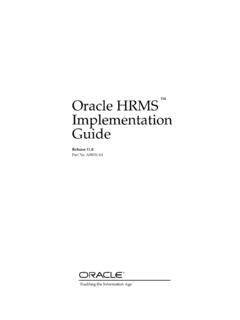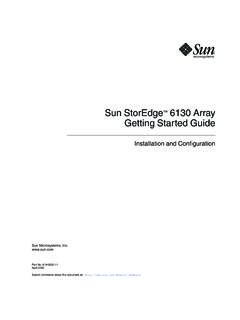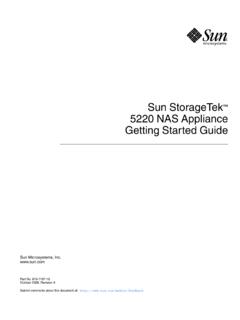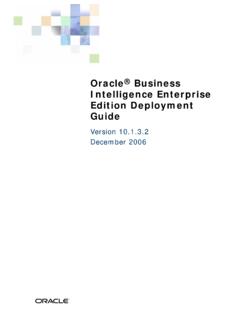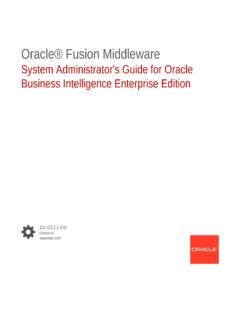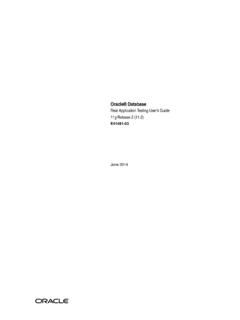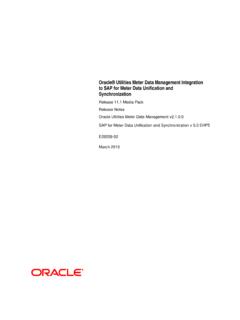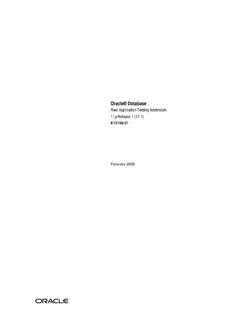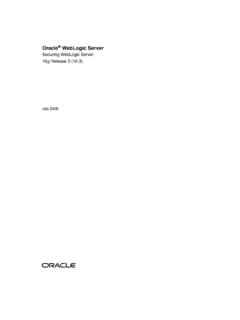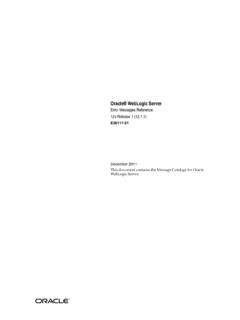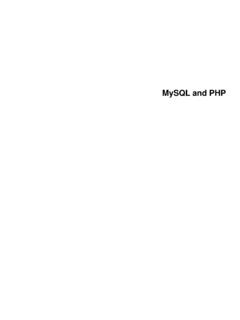Transcription of Oracle Database SQL Language Quick Reference
1 Oracle . [1] Database SQL Language Quick Reference 11g Release 2 ( ). E41085-04. January 2016. Oracle Database SQL Language Quick Reference , 11g Release 2 ( ). E41085-04. Copyright 2003, 2016, Oracle and/or its affiliates. All rights reserved. Primary Authors: Diana Lorentz, Mary Beth Roeser, Simon Watt This software and related documentation are provided under a license agreement containing restrictions on use and disclosure and are protected by intellectual property laws. Except as expressly permitted in your license agreement or allowed by law, you may not use, copy, reproduce, translate, broadcast, modify, license, transmit, distribute, exhibit, perform, publish, or display any part, in any form, or by any means.
2 Reverse engineering, disassembly, or decompilation of this software, unless required by law for interoperability, is prohibited. The information contained herein is subject to change without notice and is not warranted to be error-free. If you find any errors, please report them to us in writing. If this is software or related documentation that is delivered to the Government or anyone licensing it on behalf of the Government, then the following notice is applicable: GOVERNMENT END USERS: Oracle programs, including any operating system, integrated software, any programs installed on the hardware, and/or documentation, delivered to Government end users are "commercial computer software" pursuant to the applicable Federal Acquisition Regulation and agency-specific supplemental regulations.
3 As such, use, duplication, disclosure, modification, and adaptation of the programs, including any operating system, integrated software, any programs installed on the hardware, and/or documentation, shall be subject to license terms and license restrictions applicable to the programs. No other rights are granted to the Government. This software or hardware is developed for general use in a variety of information management applications. It is not developed or intended for use in any inherently dangerous applications, including applications that may create a risk of personal injury. If you use this software or hardware in dangerous applications, then you shall be responsible to take all appropriate fail-safe, backup, redundancy, and other measures to ensure its safe use.
4 Oracle Corporation and its affiliates disclaim any liability for any damages caused by use of this software or hardware in dangerous applications. Oracle and Java are registered trademarks of Oracle and/or its affiliates. Other names may be trademarks of their respective owners. Intel and Intel Xeon are trademarks or registered trademarks of Intel Corporation. All SPARC trademarks are used under license and are trademarks or registered trademarks of SPARC International, Inc. AMD, Opteron, the AMD logo, and the AMD Opteron logo are trademarks or registered trademarks of Advanced Micro Devices.
5 UNIX is a registered trademark of The Open Group. This software or hardware and documentation may provide access to or information about content, products, and services from third parties. Oracle Corporation and its affiliates are not responsible for and expressly disclaim all warranties of any kind with respect to third-party content, products, and services unless otherwise set forth in an applicable agreement between you and Oracle . Oracle Corporation and its affiliates will not be responsible for any loss, costs, or damages incurred due to your access to or use of third-party content, products, or services, except as set forth in an applicable agreement between you and Oracle .
6 Contents Preface .. v v Documentation Accessibility .. v Related Documents .. v Conventions .. vi 1 SQL Statements Syntax for SQL 1-1. 2 SQL Functions Syntax for SQL 2-1. 3 SQL Expressions Syntax for SQL Expression 3-1. 4 SQL Conditions Syntax for SQL Condition Types .. 4-1. 5 Subclauses Syntax for 5-1. 6 Data Types Overview of Data Types .. 6-1. Oracle Built-In Data 6-2. Oracle -Supplied Data 6-5. Converting to Oracle Data 6-5. 7 Format Models Overview of Format Models .. 7-1. Number Format 7-1. Number Format Elements .. 7-1. Datetime Format Models .. 7-3. Datetime Format Elements .. 7-3. iii A SQL*Plus Commands SQL*Plus Commands.
7 A-1. Index iv Preface This Reference contains a complete description of the Structured Query Language (SQL) used to manage information in an Oracle Database . Oracle SQL is a superset of the American National Standards Institute (ANSI) and the International Organization for Standardization (ISO) SQL:1999 standard. This Preface contains these topics: Audience Documentation Accessibility Related Documents Conventions Audience The Oracle Database SQL Language Quick Reference is intended for all users of Oracle SQL. Documentation Accessibility For information about Oracle 's commitment to accessibility, visit the Oracle Accessibility Program website at Access to Oracle Support Oracle customers that have purchased support have access to electronic support through My Oracle Support.
8 For information, visit or visit if you are hearing impaired. Related Documents For more information, see these Oracle resources: Oracle Database PL/SQL Language Reference for information on PL/SQL, the procedural Language extension to Oracle SQL. Pro*C/C++ Programmer's guide , Oracle SQL*Module for Ada Programmer's guide , and the Pro*COBOL Programmer's guide for detailed descriptions of Oracle embedded SQL. v Many of the examples in this book use the sample schemas, which are installed by default when you select the Basic Installation option with an Oracle Database installation. Refer to Oracle Database Sample Schemas for information on how these schemas were created and how you can use them yourself.
9 Conventions The following text conventions are used in this document: Convention Meaning boldface Boldface type indicates graphical user interface elements associated with an action, or terms defined in text or the glossary. italic Italic type indicates book titles, emphasis, or placeholder variables for which you supply particular values. monospace Monospace type indicates commands within a paragraph, URLs, code in examples, text that appears on the screen, or text that you enter. vi 1. 1 SQL Statements This chapter presents the syntax for Oracle SQL statements. This chapter includes the following section: Syntax for SQL Statements Syntax for SQL Statements SQL statements are the means by which programs and users access data in an Oracle Database .
10 The sections that follow show each SQL statement and its related syntax. Refer to Chapter 5, "Subclauses" for the syntax of the subclauses listed in the syntax for the statements. See Also: Oracle Database SQL Language Reference for detailed information about Oracle SQL. ALTER CLUSTER. ALTER CLUSTER [ schema. ]cluster { physical_attributes_clause | SIZE size_clause | allocate_extent_clause | deallocate_unused_clause | { CACHE | NOCACHE }. } .. [ parallel_clause ] ;. ALTER Database . ALTER Database [ Database ]. { startup_clauses | recovery_clauses | database_file_clauses | logfile_clauses | controlfile_clauses | standby_database_clauses | default_settings_clauses | instance_clauses | security_clause }.
